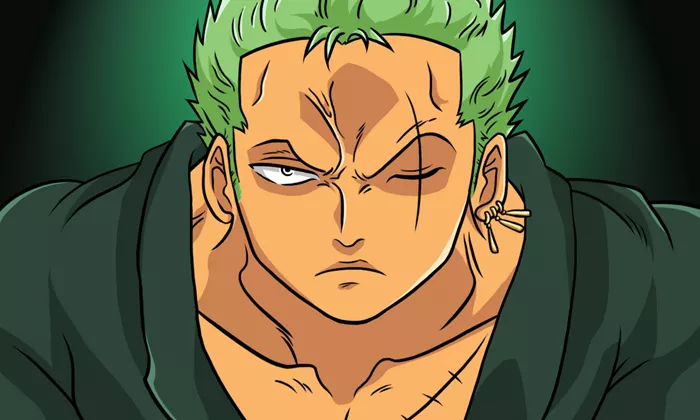Roronoa Zoro, one of the most iconic characters in the popular anime and manga series “One Piece,” is known for his distinctive appearance, unique fighting style, and unwavering determination. Among the many questions fans have about this enigmatic swordsman is whether he bears tattoos. This article delves into the myth and reality surrounding Roronoa Zoro’s tattoos, exploring their significance, origins, and the cultural context within the “One Piece” universe.
Roronoa Zoro
Character Background
Roronoa Zoro, often referred to as “Pirate Hunter Zoro,” is a central character in the “One Piece” series created by Eiichiro Oda. He is the swordsman of the Straw Hat Pirates, led by the main protagonist, Monkey D. Luffy. Zoro is known for his stoic demeanor, exceptional swordsmanship, and ambition to become the world’s greatest swordsman.
Physical Appearance
Zoro’s appearance is instantly recognizable, characterized by his green hair tied in a ponytail, muscular physique, and signature three-sword style. His body is adorned with scars, a testament to his intense training and countless battles. However, the presence of tattoos on Zoro’s body remains a subject of debate among fans.
The Myth of Zoro’s Tattoos
Origins of the Myth
The speculation surrounding Zoro’s tattoos can be traced back to certain depictions of the character in the “One Piece” manga and anime. In various scenes, particularly during intense battle sequences or moments of reflection, intricate patterns resembling tattoos are visible on Zoro’s chest, arms, and back.
Fan Interpretations
Fans of the series have offered numerous interpretations of these markings, speculating on their significance and symbolism. Some believe that Zoro’s tattoos represent his loyalty to his captain and crewmates, while others view them as symbols of his commitment to his dream of becoming the world’s greatest swordsman.
Artistic License
It’s important to note that the presence of tattoos on Zoro’s body may be attributed to artistic license rather than intentional design. In manga and anime, artists often incorporate visual elements to enhance character aesthetics or convey deeper themes, regardless of their literal presence in the story.
Reality: Zoro’s Lack of Tattoos
Official Statements
Despite fan speculation and artistic depictions, there is no canonical evidence to support the existence of tattoos on Zoro’s body within the “One Piece” series. Eiichiro Oda, the creator of “One Piece,” has not confirmed or acknowledged the presence of tattoos on Zoro’s character.
Visual Confirmation
Close examination of official manga panels and anime episodes reveals that Zoro’s skin is consistently depicted as unadorned by tattoos. While intricate patterns may occasionally appear during dynamic action sequences, they are likely artistic embellishments rather than permanent markings on Zoro’s body.
Merchandise and Adaptations
Official merchandise, promotional material, and adaptations of “One Piece” also uphold the portrayal of Zoro without tattoos. Action figures, posters, and other licensed products featuring the character depict him with clean, unmarked skin, further reinforcing the absence of tattoos in the canonical depiction of Zoro.
See Also: is avatar pg 13
Cultural Context and Significance
Tattoo Culture in Japan
In Japan, tattoos have a rich cultural history dating back centuries. Traditionally associated with criminal organizations, tattoos were often used as a form of identification or affiliation within the yakuza (Japanese mafia). Despite the historical stigma, tattoos have become increasingly popular as a form of self-expression and artistry in modern Japanese society.
Perceptions of Tattoos
Despite their growing acceptance, tattoos remain somewhat taboo in certain professional and social contexts in Japan. While attitudes are evolving, visible tattoos are still often associated with delinquency or rebellion, particularly among older generations.
Depictions in Media
In manga and anime, tattoos are frequently used to convey character traits, affiliations, or personal histories. Characters adorned with tattoos may be portrayed as rebellious, mysterious, or connected to the criminal underworld, reflecting the cultural perceptions and associations surrounding tattoos in Japan.
Fan Interpretations and Artwork
Creative Expression
While Zoro’s lack of canonical tattoos is undeniable, fans continue to explore and interpret the character through their own creative expressions. Fan art, cosplay, and fan fiction often incorporate tattoos as a means of personalizing and reimagining Zoro’s appearance, reflecting individual interpretations and artistic liberties.
Symbolism and Imagery
In fan works, tattoos are frequently used to symbolize aspects of Zoro’s character, such as his strength, resilience, and dedication to his goals. Imagery inspired by traditional Japanese tattoos, including dragons, waves, and sakura blossoms, may be incorporated to evoke themes of honor, loyalty, and perseverance.
Community Engagement
The “One Piece” fandom is known for its vibrant creativity and engagement with fan-generated content. Discussions, fan theories, and artwork exploring Zoro’s hypothetical tattoos foster a sense of community and shared enthusiasm among fans, enriching the collective experience of enjoying the series.
Conclusion: Separating Myth from Reality
In conclusion, while speculation and fan interpretations may suggest otherwise, Roronoa Zoro, the iconic swordsman of “One Piece,” does not have tattoos in the canonical depiction of the character. Despite occasional artistic embellishments or visual cues, there is no definitive evidence to support the existence of tattoos on Zoro’s body within the series.
The myth of Zoro’s tattoos highlights the enduring fascination and creativity of fans within the “One Piece” fandom. Through speculation, interpretation, and artistic expression, fans contribute to the rich tapestry of fan culture surrounding the beloved series, enriching the collective experience of engaging with its characters and world.
As the “One Piece” saga continues to captivate audiences worldwide, the mystery and allure of characters like Roronoa Zoro will undoubtedly inspire further exploration and imagination, ensuring their enduring legacy in the realm of anime and manga fandom.

